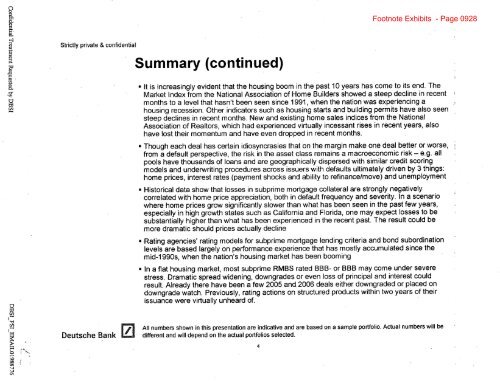2007_Subprime_Shorting-Home-Equity-Mezzanine-Tranches-1
2007_Subprime_Shorting-Home-Equity-Mezzanine-Tranches-1
2007_Subprime_Shorting-Home-Equity-Mezzanine-Tranches-1
Create successful ePaper yourself
Turn your PDF publications into a flip-book with our unique Google optimized e-Paper software.
Footnote Exhibits - Page 0928<br />
Strictly private & confidential<br />
Summary (continued)<br />
* It is increasingly evident that the housing boom in the past 10 years has come to its end. The<br />
Market Index from the National Association of <strong>Home</strong> Builders showed a steep decline in recent<br />
months to a level that hasn't been seen since 1991, when the nation was experiencing a<br />
-n housing recession. Other indicators such as housing starts and building permits have also seen<br />
steep declines in recent months. New and existing home sales indices from the National<br />
Association of Realtors, which had experienced virtually incessant rises in recent years, also<br />
have lost their momentum and have even dropped in recent months.<br />
* Though each deal has certain idiosyncrasies that on the margin make one deal better or worse,<br />
from a default perspective, the risk in the asset class remains a macroeconomic risk - e.g. all<br />
pools have thousands of loans and are geographically dispersed with similar credit scoring<br />
models and underwriting procedures across issuers with defaults ultimately driven by 3 things:<br />
home prices, interest rates (payment shocks and ability to refinance/move) and unemployment<br />
* Historical data show that losses in subprime mortgage collateral are strongly negatively<br />
correlated with home price appreciation, both in default frequency and severity. In a scenario<br />
where home prices grow significantly slower than what has been seen in the past few years,<br />
especially in high growth states such as California and Florida, one may expect losses to be<br />
substantially higher than what has been experienced in the recent past. The result could be<br />
more dramatic should prices actually decline<br />
* Rating agencies' rating models for subprime mortgage lending criteria and bond subordination<br />
levels are based largely on performance experience that has mostly accumulated since the<br />
mid-1 990s, when the nation's housing market has been booming<br />
* In a flat housing market, most subprime RMBS rated BBB- or BBB may come under severe<br />
stress. Dramatic spread widening, downgrades or even loss of principal and interest could<br />
result. Already there have been a few 2005 and. 2006 deals either downgraded or placed on<br />
downgrade watch. Previously, rating actions on structured products within two years of their<br />
issuance were virtually unheard of.<br />
Cj2<br />
D t h k All numbers shown in this presentation are indicative and are based on a sample portfolio. Actual numbers will be<br />
Deutsche Banik different and will depend on the actual portfolios selected.<br />
4<br />
00<br />
00



